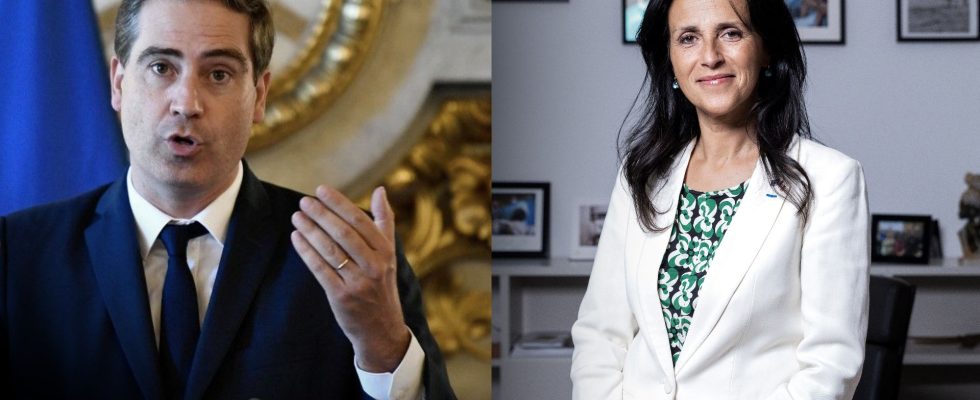In “Who wants to be my partner?” on M6, young creators of start-ups try to convince seasoned entrepreneurs. On March 23, in Paris, two young ministers will engage in the same exercise of the “pitch” in front of an audience of bosses. But not to ask them for money: to offer it to them! Organized by Chrysoula Zacharopoulou, Secretary of State for Francophonie and Development, and Olivier Becht, Minister Delegate for Foreign Trade, this seminar aims to raise awareness of a vast investment plan supported by the European Commission, “Global Gateway “. Since its launch at the end of 2021, this “strategy of sustainable and reliable connections at the service of citizens and the planet” had been lost in the maze of Brussels technocracy. Its objective is however simple: to finance essential infrastructures (ports, roads, hospitals, fiber optics, etc.) in Africa, South America and the Indo-Pacific zone, by placing European industrialists at the forefront. Chrysoula Zacharopoulou and Olivier Becht detail the opportunities for French companies.
L’Express: What is the philosophy of the “Global Gateway” plan implemented by the European Commission?
Chrysoula Zacharopoulou : In December 2021, the European Commission presented this device which makes it possible to mobilize public and private financing with the European flag all over the world. An envelope of 300 billion euros is planned, half of which is intended for the African continent. Investment themes in essential infrastructure have been identified: digital, transport, health, climate, energy, education and research.
During my trips to Africa in recent months, my interlocutors often asked me: “Where are these projects going? When will the funds arrive?” On the other hand, many companies were wondering how to access this financing. During a recent board meeting with Commission President Ursula Von der Leyen, Foreign Ministers, in the presence of the European Bank for Reconstruction and Development (EBRD) and the European Investment Bank (EIB), who participate in the system, I therefore pleaded for the operational implementation to be accelerated.
The idea of this seminar, organized in collaboration with the Medef, is to bring the European Commission to Paris, to enable it to present these projects and explain to companies the procedures for calls for tenders. We often go to Brussels, it is good, too, that Brussels comes from time to time to the Member States.
Olivier Becht : The “Global Gateway” strategy is a win-win approach. This is a win for European and French companies, which can thus open up new high-potential markets. And it is a win-win situation for the countries that are the object of these investments, because the latter create employment, growth, political stability and security. We are expecting 300 companies at this seminar. We hope to mobilize them so that they position themselves on the calls for projects, and win them.
Some French groups today hesitate to push their pawns in Africa because they fear not being able to work there in compliance with the legal and ethical rules that are imposed on them, moreover, at the global level. How to reassure them?
OB : The projects are filtered by the European Commission according to criteria relating to sustainable development and respect for social rights. It is an essential guarantee for companies. Among the files that are well advanced, there is one in Namibia, which relates to renewable hydrogen. In Tanzania, it is a hydroelectric plant to be built. And in Kenya, a 175 kilometer highway linking Nairobi to Mau Summit. Vinci is already in the running, as part of a public-private partnership, with the support of the Meridiam investment fund.
CZ : Europe does not place itself in a logic of predation. The “Global Gateway” approach is to create, with the authorities of the countries concerned, a business climate of trust. We provide technical assistance, training, local employment, when the other great powers often bring their workers, build a bridge and then leave…
Haven’t the Chinese, with their ambition to open “new silk roads”, taken a step ahead in Africa?
OB : Their investments aimed to create infrastructure to ensure strategic flows to China and then export from China to the rest of the world. But since Chinese growth began to slow in 2018, many of these projects have been shelved. In addition, some countries, which had borrowed colossal sums from Beijing, found themselves on the verge of over-indebtedness. Europe’s approach is quite different. It is part of a logic of development and partnership, even if, of course, the question of supplying our economies with strategic resources is indeed present. The scope of “Global Gateway” is also wider than the “New Silk Roads” since health and education are included.
CZ : One of Africa’s foremost trading partners is the European Union. We don’t say it enough. While we support local value chains that allow partner countries to export processed rather than raw products, we dare not say so loud and clear. When the Chinese actors build a building in Addis Ababa, we see it, it is written in big letters on a banner. It is time to assume our actions and our values, and to value them too.
